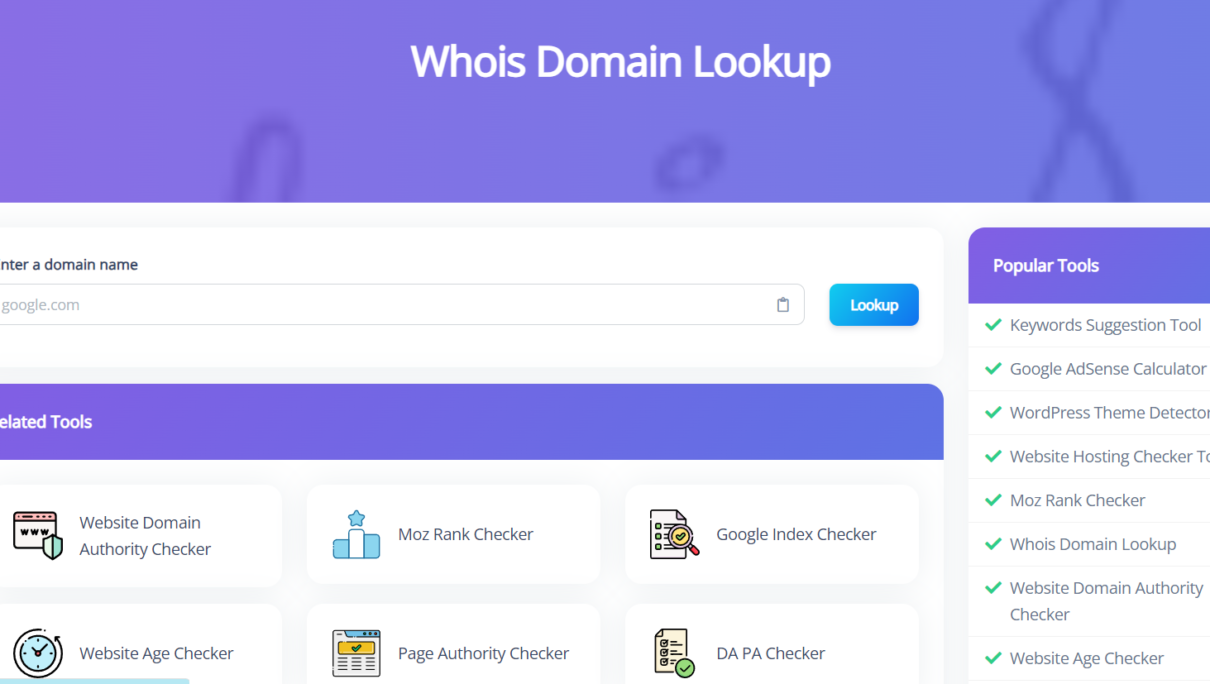When you register a domain name, your personal or business information becomes a part of the domain registration database known as Whois. This database holds crucial details about domain names, their registrants, and associated administrative and technical contacts. One of the most powerful tools available for anyone looking to gather information about a domain is the Whois domain lookup.
In this article, we’ll delve into what Whois domain lookup is, how it works, and why it is essential for website owners and online users.
What is Whois Domain Lookup?
Whois is a protocol used to query databases that store domain registration details. A Whois domain lookup provides key information such as:
- Domain name registrant: The person or entity who owns the domain.
- Registrar: The service provider that manages the registration.
- Registration and expiration dates: Key dates that indicate when the domain was registered and when it will expire.
- Contact information: Administrative and technical contact details, including names, email addresses, and phone numbers.
- Nameservers: The DNS servers associated with the domain.
How Does Whois Domain Lookup Work?
Whenever you perform a Whois domain lookup, you are essentially querying a database maintained by ICANN (Internet Corporation for Assigned Names and Numbers) or a regional internet registry. The Whois database is a globally recognized system used to store data about domain ownership, and it can be accessed through various tools and websites.
You can perform a Whois domain lookup through:
- Domain Registrars: Most domain registrars, like GoDaddy or Namecheap, provide an option to look up domain information on their websites.
- Online Whois Tools: Several independent websites allow users to conduct Whois searches, offering a straightforward interface for easy querying.
- Command Line Interface (CLI): For more technical users, Whois queries can also be performed through command line tools in operating systems like Linux, macOS, or Windows.
Importance of Whois Domain Lookup
Whois domain lookup offers several practical uses for website owners, businesses, and individuals. Here’s why it matters:
- Domain Ownership Verification: If you’re planning to purchase a domain, a Whois lookup can help verify that the seller is indeed the rightful owner of the domain. It also helps in detecting fraudulent activity if the ownership details are falsified.
- Tracking Domain Expiration Dates: As a domain owner, keeping track of your domain’s expiration date is critical to avoid losing it to someone else. A Whois lookup ensures that you’re aware of key dates for renewal.
- Investigating Malicious Websites: If you suspect a website is involved in spamming, phishing, or any other malicious activities, a Whois lookup can reveal who is behind the site and provide relevant contact information for reporting abuse.
- Competitive Research: Businesses often conduct Whois lookups to gather information on their competitors’ domain ownership, registrar details, or domain expiration, which could offer strategic advantages.
- Managing Multiple Domains: If you own or manage several domain names, using Whois lookup can help you track and organize your domains efficiently.
Whois Privacy and Data Protection
While Whois provides valuable information, it also raises concerns about privacy. Exposing personal details like names, addresses, and phone numbers through a Whois lookup can lead to unwanted solicitations, identity theft, or cyberattacks. To address this, domain registrars offer Whois privacy protection services.
When Whois privacy is enabled, your personal details are masked from public view, and instead, the contact details of the registrar or a privacy service are shown. This protects your identity while still fulfilling ICANN’s requirement for public domain registration records.
Conclusion
Whois domain lookup is an essential tool for anyone involved in managing websites or tracking domains. Whether you’re verifying ownership, checking expiration dates, or conducting research, the ability to access this information empowers domain owners and users to make informed decisions. However, if privacy is a concern, using Whois privacy protection services can help keep your personal information secure while maintaining control of your domain.

